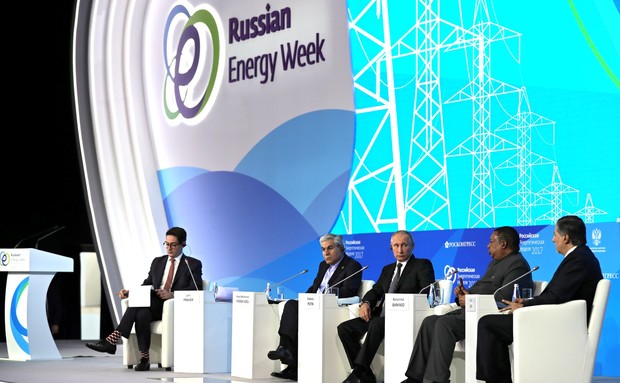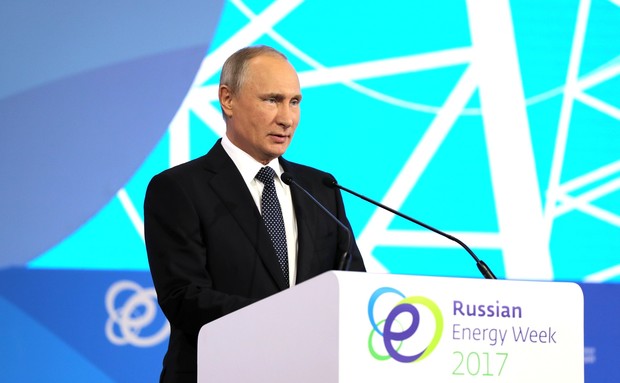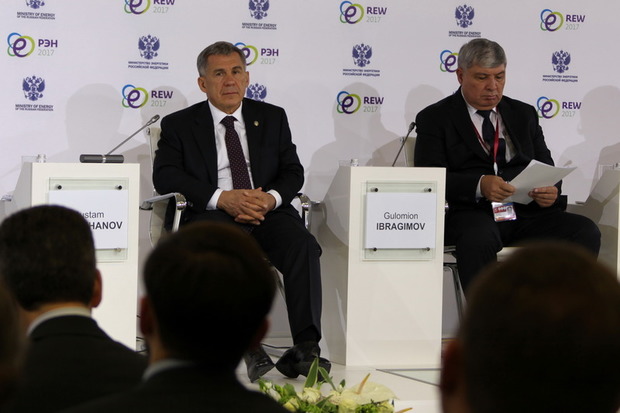Vladimir Putin: ''Almost two billion people don’t have full access to energy sources''
Russian Energy Week kicks off in Moscow
The Russian Energy Week forum kicked off in Moscow. Representatives of the biggest international and Russian companies as well as leading experts became its participants. Global problems, the logic and development tendencies of the energy and oil markets were the main focus of attention. Realnoe Vremya tells how the fall of barrel price affected companies' income, whether alternative energy sources will develop in Russia and why the future lies with the chemical sector.
In 20 years, people will need 30% more energy
The main plenary session where Russian President Vladimir Putin became a speaker began in the afternoon. In fact, it marked the opening of the energy forum.
Having welcomed the guests and defined main discussion vectors, Vladimir Putin approached the main trends that would 'define the energy future of all human kind' in the future. By experts' estimates, in 20 years, people will need 30% more energy than today. From the Russian leader's point of view, it is, first of all, linked with the development of the world economy, growth of the planet's population, higher quality of life and consumption level. ''Today almost two billion people don't have full access to energy sources,'' the Russian president noted. According to his version, the demand geography and structure will shift to, first of all, the Asia-Pacific region.

Several experts think that the energy balance is going to shift towards hydrocarbons in the next 20-25 years. In addition, a competition between fuels, first of all, conventional and new energy sources, is expected. In his speech, Vladimir Putin also mentioned the future of alternative energy. More than half of all the implemented generating capacities in the world is already used to develop renewable sources. By 2035, their share in the world energy balance will grow from 15 to 23% and electricity generation – from today's 7 to 20%. Then Putin defined such world tendencies as the reduction of the economy's energy intensity, digitalisation of the energy complex and more accessibility of energy resources and energy infrastructure, in general.
The share of clean energy sources to increase to 90% in the future
The next part of the president's speech was about tendencies that characterise Russian power engineering. Putin stressed the uninterrupted development and constant modernisation of the country's Heat and Energy Complex. The role of Tatarstan, Amur and Tobolsk clusters of the country as well as the Eastern Oil Company in the competitive growth of Russia's Heat and Energy Complex on the international stage was especially noted. Clean energy sources in Russia account for 84% of the total generating volume. By the president's forecasts, this share is going to increase to up to 90% by 2035. It is also planned to increase electricity generation based on renewable sources in the next 20 years. The president emphasised that Russia was going to stimulate investments in alternative power engineering.

It is also scheduled to reduce GDP's energy intensity about 1,5 times by 2035. The economy's reconstruction, reduction of losses in the grid, implementation of energy saving and digital technologies, decrease of brake specific fuel consumption in transport and electricity generation will help it.
In his speech, Vladimir Putin also mentioned the barriers of the energy sector's development. First of all, they are sanctions that other countries impose on the sector. ''A series of sanctions are directly used by our partners, some countries do it for a dishonest competition – it is just impossible to say otherwise – to push their own interests and energy resources despite their uncompetitiveness,'' Putin said.
Among the positive factors of the energy market's stabilisation, the president noted an agreement with OPEC on oil production cut that Russia signed in late 2016. Within the agreement, Russia obliged to cut oil production by 300,000 barrels a day. Then oil production exceeded consumption, the reserves were critical. Energy carrier prices fell, and, first of all, it affected oil. Thanks to the agreement, they managed to not only stabilise the market but also return investments in this sector of the economy. We need to note that the agreement expires in March 2018. In answer to the moderator's question whether Russia was going to continue working within the agreement, the president did not exclude possible prolongation. ''Everything will depend on the situation in the world market. In general, I don't exclude it,'' Putin concluded.
Export of heavy chemicals first exceeds import
Oil refining became the key topic on many platforms of the forum. IHS Markit Vice-Chairman Daniel Yergin started his speech with optimistic numbers in 'World Petrochemical Markets: Possibilities for Russia' panel discussion. A global rise began after difficult 6 years in the world economy. It is forecasted that next year Russia's economic rise will amount to 2,1%, Europe – 2,2%, the USA – 3,3% and China – 6,5%. Such dynamics also explain the oil demand that started in the last several months.
The petrochemical sector is strategic for Russia. And this year the export of heavy chemicals has exceeded first the import thanks to the government support of companies. The government is going to update programmes on tardy light chemicals at the beginning of the next year.
''Let's put a simple example – tyre production. Russia has quite good tyre factories that our big companies together with Italian partners invested in. But foreign spare components account for a considerable part of the feedstock, it is light chemicals. There is a great deal of such examples. We have a clear plan of actions on the list. And it doesn't mean it is a directive plan. It is a signal for the market about the government's priorities. We think the sector will remain one of the key drivers of economic growth in Russia and around the world. Petrochemistry's growth paces have considerably passed the growth of the world economy in the last tens of years,'' told Deputy Chairman of the Government of Russia Arkady Dvorkovich.
Development of chemistry is ahead of GDP
The growth of the chemical sector was 1,6% ahead of GDP from 1990 to 2005. In the last years, the speed has reduced to 1,4%, and the paces are going to slow down to 1,1% soon. But the sphere will anyway develop faster than GDP.
''A positive tendency is that chemistry substitutes such materials as metal and wood in different industrial sectors and is more applicable due to innovations. But there is a negative trend – developed economies save money more. There is a closed cycle and recycling of plastics that can negatively put pressure on the growing demand for plastics and components,'' told head partner of McKinsey & Company Daria Borisova.
Oil price's fall has almost affected income volume. Daria Borisova explained that when prices reduced, the prime cost of products also fell, and prices were fixed by orienting to costly manufacturers. This is why the companies that have cheap feedstock managed to earn.
''We see that the main investments will continue in the regions with cheap feedstock because the money is not paid back in other regions. In the last 1,000 years, petrochemistry has reoriented to the regions with competitive feedstock, and Russia needs to expand its presence there. One can build a factory in the regions with the cheap feedstock. It is necessary to build and deliver products to the regions with growing consumption,'' Daria Borisova believes.

''Our programme is to increase Nizhnekamskneftekhim's production volumes by 2025''
The main goal of gas and petrochemistry is to build factories in the regions with the cheap feedstock. Chairman of the Board of Directors of SIBUR CJSC Dmitry Konov agreed with it. For instance, SIBUR is going to launch a petrochemical complex in Tobolsk by 2018 whose feedstock will come from all Western Siberia. According to Dmitry Konov, the complex is almost identical to Tatarstan's Nizhnekamskneftekhim.
''SIBUR is our partner, we have close contacts. If we are talking about Nizhnekamskneftekhim, today it is the biggest polymer producer. We make 700,000 tonnes of polymers a year, about 700,000 tonnes of rubbers, and the plans are ambitious. We have a big project on construction of an ethylene complex. We need to complete the whole complex by 2021 – not only on ethylene but derivatives that we will make on this site. Our programme is to increase Nizhnekamskneftekhim's production volumes by 2025,'' Tatarstan President Rustam Minnikhanov shared his plans.
In the panel discussion, the Tatarstan president was asked to reveal the secret on how to look for partners for projects. ''It is necessary to find ways and create understandable relations and always keep promises, of course,'' Rustam Minnikhanov put his cards on the table.